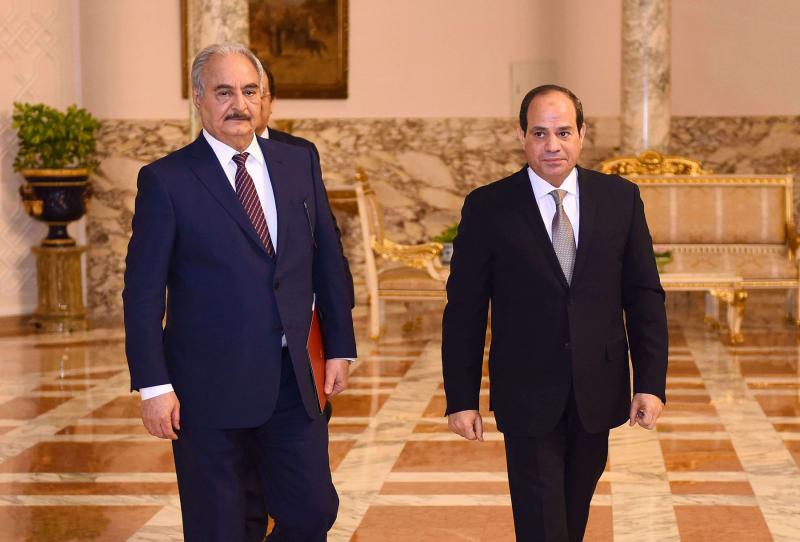CAIRO – Egypt’s openness to the interim authorities in Tripoli has reduced its reliance on Field Marshal Khalifa Haftar, commander of the Libyan National Army (LNA).
Some analysts cite his absence a few days ago, from the opening ceremony of the ” July 3″ naval base close to the border with Libya as proof of the relative fraying of the relationship between the two sides.
By comparison, the LNA chief was present at the opening of the near-by Mohammed Najib base four years ago.
Observers believe that the presence of the President of the Libyan Presidency Council, Muhammad al-Menfi and the absence of Haftar were further evidence that Egypt has begun to adjust its approach, focusing its attention on the Tripoli-based and internationally-backed authorities.
Haftar may still wield military influence and play a role combating terrorism, in a way that has helped Egypt secure a part of its border with Libya. However, in the final analysis, the LNA leader does not enjoy political legitimacy and if any forces deal with him either secretly or publicly it is only because he is part of the reality on the ground.
The main turning point in Egypt’s relationship with Haftar was his military advance towards Tripoli in April 2019 under the pretext of liberating it from the grip of militias and other armed groups. These forces controlled at least part of the political decision-making process and supported the interests of their benefactors in doing so.
Egyptian political sources told The Arab Weekly that Cairo was wary at the time that the LNA’s movement towards Tripoli could be a “trap” for Haftar, considering the great distance between Benghazi and Tripoli, the difficulty of moving troops and equipment and the complexity of war in a city that has turned into a hub for armed militias.
Haftar was determined to carry out his plan under the pretext that he had received a green light from major powers. But he pulled back about a year later after his offensive failed. He has since tried to preserve what remains of his forces in the eastern region.
Egypt’s reservations about Haftar’s unprofessional military behaviour increased when his inflated ego became an immediate burden for Cairo. Every time he flexed his muscles, attention turned to Egypt as his main backer, which made the government of Abdel Fattah al-Sisi lose any claim to impartiality and limited its margin of manoeuvre vis- a-vis international powers involved in the Libyan political settlement process.
The same Egyptian sources told The Arab Weekly, “Haftar’s role has become problematic. Egypt does not want to abandon him completely and search for an alternative to him. But it does not want to mortgage its interests with him after the rapid changes that occurred since he withdrew from Tripoli last year. The aloofness of Saudi Arabia and the UAE towards the Libyan National Army commander has encouraged Cairo to adjust its position towards him.”
Cairo took advantage of the transformations to try to demonstrate that its relationship with Libya was not limited to the east. It opened up to many players in the west and south so as to perform a more effective role and contain Turkey’s growing influence which benefits greatly from Egypt’s absence from Tripoli.
Cairo has reset its relationship with the Libyan House of Representatives, the Tobruk branch and its president, Ageela Saleh. At the same time, it has reached out to the Tripoli branch of parliament, which encouraged Saleh to expand his circle of relations and enter into talks with the Libyan State Council and its Brotherhood-affiliated leader Khaled al-Meshri. Saleh’s approach was interpreted by Cairo as a form of political pragmatism.
Egypt has nonetheless endeavoured to maintain the cohesion of the eastern front (Haftar-Ageela), even as its calculations changed.
Observers describe the relationship between Egypt and Haftar as very complex, which makes it seem to be wavering. But the field marshal is still a card among others for Egypt in the Libyan crisis, for war or for peace.
Egypt is distancing itself from the Libyan National Army in the east without actually severing its ties with the force. It sees that its only alternative now is to work for the unification of the armed forces as a key factor in the security and stability of Libya, including the border with Egypt.
Should this step fail, Egypt will fall back on ensuring the cohesion of east-based forces under Haftar and other reliable commanders, especially since most senior officers affiliated with the LNA have been trained in Egypt.
Observers also believe that the resilience of this card, that of Haftar and the LNA, is important for Egypt for other reasons. The ambiguity surrounding the political process and the lack of determination on the part of the international community to deal with foreign interventions and mercenaries, may mean that war could erupt again with the same intensity as before.
Egypt still fears the spectre of partition and sees the need for a military force that can keep Libya’s eastern region together, as it is an area of prime importance for Egypt. It considers the region as part of Egypt’s vital space alongside its oil riches that should not fall in the hands of Cairo’s rivals.
These considerations are likely to determine the direction of Egypt’s wavering stance over Haftar and its policies in Libya in the foreseeable future.
Source: Arab Weekly



